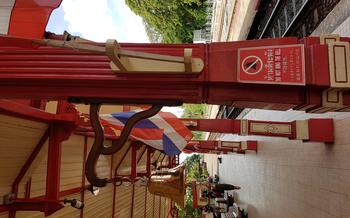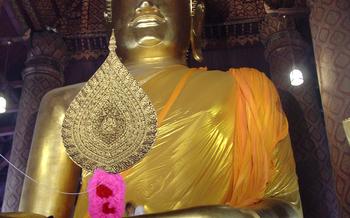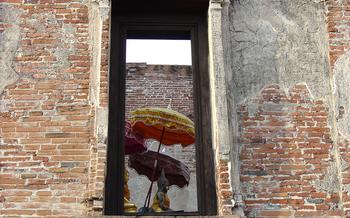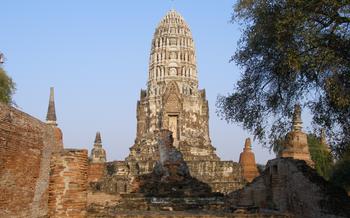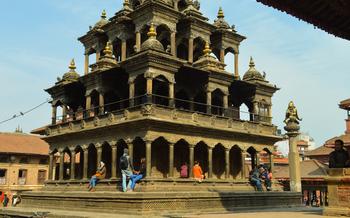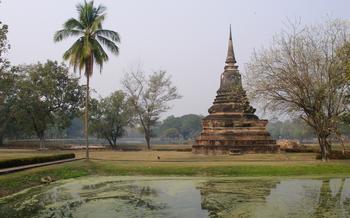
Khao Sam Yot National Park
- Introduction: Exploring the Enchantments of Khao Sam Yot National Park
- Accessibility and History
- Topography and Natural Features
- Hiking Trails: Exploring the Wilderness
- Khao Sam Yot Caves: A Journey into the Underworld
- Wildlife Spotting: In Search of Rare Species
- Camping and Accommodation: Embracing Nature
- Insider Tip:
- Laem Sala Beach: A Coastal Paradise
- Tham Khao Daeng: The Bat Cave
- Local Culture and Cuisine: A Taste of Lopburi
- Photography Opportunities: Capturing Nature's Beauty
- Responsible Tourism: Preserving the Sanctuary
- Getting There: Transportation Options
- Travel Tips: Planning Your Adventure
- Insider Tip: Hidden Gems and Secret Spots
Introduction: Exploring the Enchantments of Khao Sam Yot National Park
Nestled in the heart of Thailand's Lopburi province, Khao Sam Yot National Park beckons travelers with its alluring combination of natural wonders, historical significance, and rich biodiversity. Spanning over 200 square kilometers, this coastal gem boasts a diverse landscape that encompasses limestone karsts, lush forests, pristine beaches, and a network of intriguing caves. Whether you're an avid hiker, a wildlife enthusiast, a history buff, or simply seeking a tranquil escape into nature, Khao Sam Yot offers an unforgettable adventure for every traveler.
Accessibility and History
Khao Sam Yot is conveniently located just a few hours' drive from Bangkok, making it an ideal day trip or weekend getaway. The park is well-connected by public transportation, with regular buses and vans departing from Bangkok's Southern Bus Terminal. Once in the park, visitors can explore the various attractions on foot, by bicycle, or by boat.
The park's history dates back to the prehistoric era, with evidence of human habitation in the area dating back over 2,000 years. The caves within the park have been used as shelter by humans for centuries, and some of them contain ancient paintings and inscriptions. In the 19th century, Khao Sam Yot was declared a royal hunting ground, and it was later designated as a national park in 196
Topography and Natural Features
Khao Sam Yot National Park is renowned for its stunning topography and diverse natural features. The park is dominated by a series of limestone karsts that rise dramatically from the surrounding landscape. These karsts have been sculpted by millions of years of erosion, creating a unique and awe-inspiring landscape.
The park also boasts lush forests, which are home to a wide variety of plants and animals. The forests are interspersed with streams, waterfalls, and ponds, which provide a refreshing contrast to the rugged karsts. Along the coast, visitors can find pristine beaches, secluded coves, and stunning rock formations.
Hiking Trails: Exploring the Wilderness
Difficulty Levels and Trail Options:
Khao Sam Yot National Park offers a diverse range of hiking trails catering to all levels of hikers, from leisurely strolls to challenging treks. The well-maintained trails wind through lush forests, past limestone cliffs, and along scenic ridges, providing breathtaking views of the surrounding landscape. Whether you're a seasoned hiker seeking an adrenaline rush or a nature enthusiast looking for a relaxing walk, you'll find a trail suited to your preferences and abilities.
Scenic Viewpoints and Landmarks:
Along the hiking trails, you'll encounter numerous scenic viewpoints and landmarks that offer panoramic vistas of the park's stunning natural beauty. Stop at Khao Yai Viewpoint to witness a breathtaking sunrise over the Gulf of Thailand, or climb to the summit of Khao Daeng to enjoy a 360-degree view of the surrounding mountains and forests. Don't miss the chance to visit the iconic Phraya Nakhon Cave, a magnificent natural wonder featuring a hidden beach and towering limestone cliffs.
Wildlife Encounters and Photography Opportunities:
As you explore the hiking trails, keep your eyes peeled for the park's diverse wildlife. You might spot agile gibbons swinging through the trees, colorful birds flitting among the foliage, or shy deer grazing in the undergrowth. The park is also home to a variety of reptiles, amphibians, and insects, making it a paradise for wildlife enthusiasts and photographers. Capture stunning shots of the park's flora and fauna, from delicate wildflowers to majestic birds in flight.
Khao Sam Yot Caves: A Journey into the Underworld
The Khao Sam Yot Caves are a series of limestone caves located within the Khao Sam Yot National Park. These caves were formed millions of years ago by the erosion of the limestone karsts by rainwater. The caves are home to a variety of wildlife, including bats, birds, and snakes.
The main cave chambers are Tham Phraya Nakhon, Tham Sai, and Tham Khao Daeng. Tham Phraya Nakhon is the largest and most popular cave. It is home to a large reclining Buddha statue that was built in the 19th century. Tham Sai is a smaller cave that is known for its stalactites and stalagmites. Tham Khao Daeng is home to millions of bats.
Guided tours of the caves are available. The tours typically last for about an hour and include a visit to the main cave chambers. Visitors should wear comfortable shoes and bring a flashlight.
Safety Precautions
- Be careful when walking on the slippery cave floors.
- Do not touch the stalactites and stalagmites.
- Be aware of the bats and other wildlife in the caves.
- Do not leave any trash in the caves.
Anecdotes
- One of the most popular stories about the Khao Sam Yot Caves is the story of the reclining Buddha statue. The statue was built by a local monk in the 19th century. The monk is said to have been inspired by a dream in which he saw the Buddha reclining in the cave.
- Another popular story is the story of the bat exodus. Every night at sunset, millions of bats leave the Tham Khao Daeng cave in search of food. The bats fly in a long stream that can be seen for miles around.
Wildlife Spotting: In Search of Rare Species
Khao Sam Yot National Park is a haven for wildlife enthusiasts, boasting diverse ecosystems that support a variety of rare and endangered species. One of the park's main attractions is its rich birdlife, which includes over 300 recorded species. Birdwatchers can spot a wide range of birds, from vibrant kingfishers and colorful sunbirds to majestic eagles soaring high above the forest canopy. The park is also home to a variety of reptiles, amphibians, and mammals, including the endangered Siamese crocodile, the rare serow goat-antelope, and the elusive dusky leaf monkey.
The park's diverse habitats, ranging from lush forests to coastal mangroves, provide ideal conditions for wildlife to thrive. Visitors can explore these habitats through a network of well-maintained trails, which offer opportunities to encounter these magnificent creatures in their natural environment. Whether you're a seasoned birdwatcher or simply an avid nature lover, Khao Sam Yot National Park promises an unforgettable wildlife experience.
Highlights for Wildlife Enthusiasts:
- Birdwatching hotspots include the park's mangrove forests, coastal areas, and freshwater marshes, where you can spot a variety of waterbirds, shorebirds, and migratory species.
- Gibbon sightings are possible in the park's forests, where these endangered primates can be seen swinging through the trees.
- The park is home to a variety of reptiles, including the endangered Siamese crocodile, which can be spotted in the park's freshwater bodies.
- Visitors may also encounter other mammals such as the serow goat-antelope, the dusky leaf monkey, and various bat species.
- Wildlife photography enthusiasts can capture stunning images of the park's diverse flora and fauna.
Camping and Accommodation: Embracing Nature
Designated camping areas within the park provide an immersive experience, allowing visitors to connect with the natural surroundings. These campsites offer basic facilities, including tent platforms, restrooms, and showers, ensuring a comfortable stay in the wilderness.
Lodging options are also available within the park, ranging from simple guesthouses to luxurious resorts. These accommodations provide a more comfortable alternative for those seeking a touch of luxury while still being close to nature.
When camping or staying in the park, it's essential to pack appropriately for the weather conditions and activities planned. Insect repellent, sunscreen, and appropriate clothing are recommended. It's also advisable to bring a flashlight or headlamp for nighttime navigation.
To enhance your experience, consider booking a guided tour. Knowledgeable guides can lead you to the park's hidden gems, share insights into the local flora and fauna, and ensure your safety during activities like spelunking or wildlife spotting.
Insider Tip:
For a truly unique experience, opt for a night camping trip within the park. Imagine waking up to the sound of birdsong and the fresh scent of the forest, then setting out on an early morning hike to witness the sunrise over the stunning landscape.
Laem Sala Beach: A Coastal Paradise
Nestled within the boundaries of Khao Sam Yot National Park, Laem Sala Beach beckons travelers with its tranquil allure and pristine beauty. This hidden gem, often overlooked by visitors drawn to the park's caves and hiking trails, offers a serene escape from the hustle and bustle of daily life.
Laem Sala's pristine sandy shores gently slope into the turquoise waters of the Gulf of Thailand, inviting visitors to immerse themselves in the refreshing embrace of the sea. The beach provides a haven for those seeking solace and tranquility, with ample space to spread out, bask in the warm sunshine, and let the gentle waves lull them into a state of relaxation.
Beyond its idyllic swimming spots, Laem Sala Beach is also a geological wonder, showcasing remarkable rock formations that have been sculpted by the relentless forces of nature. These rock formations, with their intricate shapes and textures, serve as a testament to the park's rich geological history and add a touch of intrigue to the beach's serene beauty.
For those seeking a more active experience, Laem Sala Beach offers opportunities for kayaking and snorkeling. The calm waters provide a safe and accessible environment for paddlers of all skill levels to explore the coastline, while the vibrant underwater world teems with diverse marine life, waiting to be discovered by snorkelers.
Tham Khao Daeng: The Bat Cave
Nestled within the K wonder that serves as a sanctuary for millions of bats. This extraordinary cave, known as the Bat Cave, offers a unique and awe-inspiring spectacle that attracts visitors from around the world.
As dusk descends, the cave's inhabitants come to life, emerging from their subterranean abode in a mesmerizing exodus. The sky darkens as countless bats take flight, forming a swirling vortex that dances in the fading light. This enchanting display of nature's choreography is a sight to behold, leaving visitors in awe and wonder.
Beyond its natural spectacle, Tham Khao Daeng holds cultural significance for the local community. According to local legends, the cave was once inhabited by a giant who possessed supernatural powers. These tales have been passed down through generations, weaving a tapestry of myth and mystery around this extraordinary place.
Exploring Tham Khao Daeng is an unforgettable experience that combines nature's wonders with cultural allure. Whether you're a nature enthusiast, a wildlife photographer, or simply seeking a unique adventure, the Bat Cave is a must-visit destination within the Khao Sam Yot National Park.
Local Culture and Cuisine: A Taste of Lopburi
Immerse yourself in the vibrant local culture and tantalizing cuisine of Lopburi. Savor the authentic flavors of traditional Thai dishes, prepared with fresh ingredients and aromatic spices. Explore local markets and food stalls, where you can mingle with the locals and sample an array of culinary delights. Indulge in the region's signature dishes, such as "larb," a spicy meat salad, or "tom yum goong," a flavorful prawn soup.
Beyond food, Lopburi is rich in cultural heritage. Attend captivating performances of traditional Thai dance and music, showcasing the grace and artistry of the local people. Discover the intricate craftsmanship of local artisans, who create beautiful handicrafts using indigenous materials such as bamboo, wood, and silk. These handmade treasures make for unique souvenirs to cherish your memories of Lopburi.
But the culinary journey doesn't end there. Engage with the local community by participating in cooking classes or visiting family-run restaurants. Learn the secrets of Thai cuisine from local experts and immerse yourself in the warmth and hospitality of the Lopburi people. Through these interactions, you'll gain a deeper understanding of the region's culture and traditions, creating memories that will last a lifetime.
Photography Opportunities: Capturing Nature's Beauty
Khao Sam Yot National Park is a photographer's paradise, offering a diverse range of subjects to capture, from breathtaking landscapes and panoramic views to the intricate details of insects and flora.
1 Landscapes and Panoramas
The park's diverse topography, from towering limestone cliffs to pristine beaches, provides ample opportunities for capturing stunning landscape shots. Don't miss the chance to photograph the iconic Khao Sam Yot peak, which offers panoramic views of the surrounding area.
2 Macro Photography
Khao Sam Yot is home to a rich diversity of insects and flora, making it an ideal destination for macro photography enthusiasts. Capture the intricate details of butterflies, dragonflies, and other insects, or focus on the delicate petals of wildflowers and orchids.
3 Wildlife Photography
Wildlife photography is another popular pursuit in the park. With its abundance of birdlife, including hornbills, kingfishers, and sunbirds, Khao Sam Yot is a haven for bird photographers. You may also encounter other wildlife, such as gibbons, monkeys, and squirrels, offering unique photographic opportunities.
4 Tips for Capturing the Best Shots
- Use a tripod to ensure sharp images, especially when shooting in low-light conditions.
- Experiment with different shutter speeds to capture the movement of wildlife or flowing water.
- Take advantage of the golden hours (sunrise and sunset) for warm and dramatic lighting.
- Be patient and persistent. Wildlife photography often requires waiting for the perfect moment, so be prepared to spend time in one spot.
Responsible Tourism: Preserving the Sanctuary
As responsible travelers, we have a duty to minimize our environmental impact and respect the delicate ecosystems we visit. In Khao Sam Yot National Park, this means adhering to the following principles:
-
Leave No Trace: Avoid littering and dispose of waste properly in designated bins. Leave no trace of your presence in the park, allowing future generations to enjoy its pristine beauty.
-
Respect Wildlife: Observe wildlife from a distance and avoid disturbing their natural behaviors. Refrain from feeding or touching animals, as this can disrupt their feeding patterns and make them dependent on human handouts.
-
Stay on Designated Trails: Hiking and camping should be confined to designated trails to minimize damage to the park's fragile vegetation and wildlife habitats.
-
Support Local Communities: Choose local tour operators and guides who are committed to sustainable tourism practices. This helps create jobs and supports the local economy while ensuring that tourism benefits the community as a whole.
-
Contribute to Conservation Efforts: Consider donating to organizations working to protect Khao Sam Yot National Park and its wildlife. Your contribution can help fund conservation projects, research initiatives, and education programs that ensure the long-term sustainability of this natural treasure.
By embracing responsible tourism practices, we can help preserve Khao Sam Yot National Park's pristine environment and ensure that future generations can continue to enjoy its natural wonders.
Getting There: Transportation Options
Public Transportation: Khao Sam Yot National Park is easily accessible by public transportation. Regular buses depart from the Lopburi Bus Station and take about an hour to reach the park entrance. Alternatively, you can catch a train from Bangkok to Lopburi and then take a local bus or taxi to the park.
Tour Packages: Several tour operators in Lopburi offer guided tours to Khao Sam Yot National Park. These tours typically include transportation, park entrance fees, and the services of a local guide. Guided tours are a great option for those who want to learn more about the park's history, culture, and natural features.
Renting a Car: If you prefer the flexibility of exploring the park at your own pace, consider renting a car. Several car rental agencies are available in Lopburi, and the roads leading to the park are well-maintained. Renting a car is also a good option if you plan to visit other attractions in the area, such as the ancient ruins of Ayutthaya or the floating market of Damnoen Saduak.
Hiring a Local Guide: To enhance your experience, consider hiring a local guide. Local guides can provide valuable insights into the park's history, culture, and natural features. They can also lead you to hidden spots and secret caves that are not accessible to the general public. Guides can be hired through tour operators or directly at the park entrance.
Travel Tips: Planning Your Adventure
Before embarking on your Khao Sam Yot adventure, it's crucial to prepare adequately. Pack comfortable hiking shoes, insect repellent, a hat, and a refillable water bottle. A camera with a zoom lens will allow you to capture the stunning scenery and wildlife. For camping enthusiasts, remember your tent, sleeping bag, and cooking utensils.
Health and safety should be your top priority. Carry a basic first-aid kit and be aware of the potential for heatstroke and dehydration during the hotter months. Respect local customs and dress modestly when visiting temples or interacting with villagers. A friendly smile and a few basic Thai phrases can go a long way in connecting with the locals.
By following these tips, you'll be well-equipped to make the most of your Khao Sam Yot experience, ensuring a safe, enjoyable, and memorable adventure.
Insider Tip: Hidden Gems and Secret Spots
Beyond the popular attractions, Khao Sam Yot National Park holds a treasure trove of hidden gems waiting to be discovered. For those willing to venture off the beaten track, there are secluded caves, pristine waterfalls, and tranquil natural pools waiting to be explored.
One such hidden gem is Tham Khao Bin, a cave adorned with ancient Buddhist murals and stunning rock formations. To reach this hidden sanctuary, hikers must navigate a challenging trail and scramble over boulders, but the reward is an awe-inspiring sight of intricate artwork and serene tranquility.
Another secret spot is the hidden waterfall of Namtok Tan Sadet, nestled deep within the lush jungle. The path to this waterfall is unmarked and requires a bit of exploration, but the sound of cascading water and the refreshing mist make the journey worthwhile.
For those seeking a unique experience, interacting with the local villagers who reside within the park can provide valuable insights into the park's history, culture, and traditions. These friendly locals are often willing to share stories, experiences, and even guide visitors to hidden spots that remain untouched by mass tourism.
